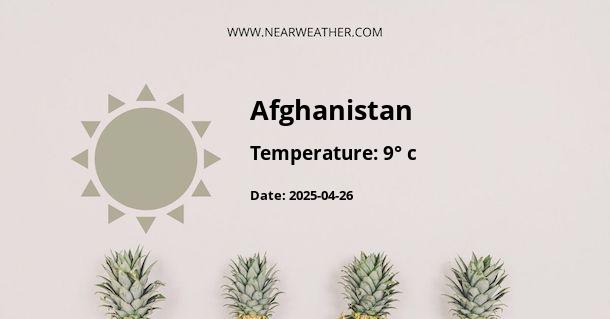Climate and Weather in the Islamic Republic of Afghanistan
Afghanistan, officially known as the Islamic Republic of Afghanistan, is a landlocked country located in South Asia. As with any other country, Afghanistan's climate and weather patterns play a significant role in shaping its landscapes, agriculture, and everyday life for its citizens. In this article, we will explore the different climate zones found in Afghanistan, as well as the weather conditions experienced throughout the year.
Geographical Factors
Afghanistan is characterized by its diverse topography, which includes mountain ranges, plateaus, and deserts. These geographical factors greatly influence the country's climate, resulting in a wide range of weather conditions.
The Hindu Kush mountain range dominates the central and northern parts of Afghanistan, acting as a barrier to moist air masses from the Indian Ocean. As a result, the country experiences a predominantly arid and semi-arid climate, with significant variations in temperature and precipitation depending on the region.
Climate Zones
Afghanistan can be divided into four major climate zones:
- High Mountain Zone: This zone covers the northern and central parts of the country and is characterized by high-altitude mountain ranges. The climate here is cold and alpine, with long, harsh winters and relatively cool summers. Snowfall is common, and temperatures can drop well below freezing.
- Steppe Zone: This zone encompasses the western and southwestern parts of Afghanistan. It is a transitional zone between the high mountains and the desert regions. The climate in this zone is semi-arid, with hot summers and cold winters. Precipitation is relatively low, and the terrain is mostly covered by grasslands and shrubs.
- Desert Zone: The south and southwest of Afghanistan fall within this climate zone. It is characterized by hot, dry summers and mild winters. Rainfall is sparse, and the region is dominated by deserts and arid plains.
- Northwestern Plains Zone: The northeastern plains of Afghanistan experience a sub-tropical continental climate. Summers are hot, with temperatures soaring above 40°C (104°F), while winters are cold, with temperatures dropping below freezing. Precipitation in this zone is relatively higher compared to other regions.
Seasonal Weather Patterns
Afghanistan experiences distinct seasonal weather patterns throughout the year:
- Spring (March to May): Spring is characterized by mild temperatures and occasional rainfall. It is a time of blossoming flowers and rejuvenation of nature after the cold winter months.
- Summer (June to August): Summers in Afghanistan are generally hot, especially in the southern and southwestern regions. Temperatures can reach extreme levels, often exceeding 40°C (104°F). The mountainous areas provide some relief with cooler temperatures.
- Autumn (September to November): Autumn brings moderate temperatures and clear skies. It is a pleasant season with colorful foliage, making it an ideal time for outdoor activities.
- Winter (December to February): Winters in Afghanistan vary depending on the region. The mountainous areas experience heavy snowfall and freezing temperatures, while the plains have milder winters with occasional snowfall. The northeastern plains can be particularly cold, with temperatures dropping below freezing.
Annual Precipitation
Precipitation levels in Afghanistan vary significantly across different regions:
| Region | Annual Precipitation (mm) |
|---|---|
| High Mountain Zone | 500-1,000 |
| Steppe Zone | 150-300 |
| Desert Zone | 50-150 |
| Northwestern Plains Zone | 300-500 |
The high mountain zone receives the highest annual precipitation, mainly in the form of snow. The desert zone, on the other hand, receives the least amount of rainfall, contributing to its arid conditions. The northwestern plains zone experiences moderate precipitation levels, while the steppe zone receives a relatively lower amount of rainfall.
Impact on Agriculture and Economy
Afghanistan's climate and weather patterns have a significant impact on its agriculture sector, which employs a large portion of the population. The availability of water, temperature variations, and precipitation levels greatly influence the types of crops that can be cultivated.
The mountainous regions with higher precipitation support the growth of crops such as wheat, corn, and barley. In contrast, the arid and desert regions rely on irrigation systems, and crops like melons, grapes, and pomegranates are cultivated. Livestock farming is also an essential part of the economy, especially in the steppe and desert regions where pasturelands are abundant.
Conclusion
Afghanistan's climate and weather are diverse and varied due to its geographical features. The country experiences a range of climate zones, including high mountains, steppes, deserts, and plains. The varying weather patterns and precipitation levels significantly impact agriculture, landscape, and the daily lives of its citizens. Understanding Afghanistan's climate is crucial for effective land management, resource allocation, and sustainable development in the country.
A - Afghanistan's Latitude is 33.000000 & Longitude is 66.000000.
A - Weather in Afghanistan is 9° today.
A - Climate Conditions in Afghanistan shows clear sky today.
A - Humidity in Afghanistan is 37% today.
A - Wind speed in Afghanistan is 11.3 km/h, flowing at 29° wind direction. today.
